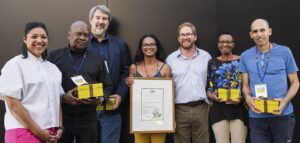Entrepreneurship is seen as a vehicle whereby any individual can start their own company and thereby provide for their families. In a wider sense, entrepreneurship services the community by providing jobs to those nearby and acting as a source of business for local suppliers.
While many people think that entrepreneurship is intrinsically linked to the activities of massive corporates, it is actually smaller companies that act as the most critical economic drivers. Recent statistics from the World Bank point out that 90% of all global firms are small to medium enterprises. Additionally, these firms are also major employers making up about 50% of global employment.
South Africa has unique challenges
Entrepreneurship is seen as a critical vehicle to address South Africa’s current unemployment crisis and a vital means for people to break their poverty cycle. Small, Medium and Micro Enterprises (SMMEs) make up about 98% of South African businesses and contribute 39% towards the South African economy.
The national agenda over the past five years has been dominated by stories of a tough economic climate and a growing energy crisis, which is impacting economic growth. South Africa needs to find a way to address these challenges, and I feel that there needs to be a greater focus on social entrepreneurship.
The US Chamber of Commerce describes social entrepreneurship as the process by which individuals, startups and entrepreneurs develop and fund solutions that directly address social issues. If used effectively, this can make a significant difference in addressing the growing unemployment crisis impacting so many South Africans.
Ingenuity within entrepreneurship
Like many countries around the world, South African SMMEs play a key role in driving the economy. The ingenuity and creativity found in these companies is remarkable given that many are run with little to no formalized business training.
Nonhlanhla Joye is a farmer, social entrepreneur, herbologist and the founder of Umgibe Farming Organics and Training Institute in KwaZulu Natal. After becoming unemployed in 2014, Joye started growing vegetables in her back garden building her produce capacity using an ingenious farming method that incorporates plastic bags.
This method is simple, yet effective. Multiple rows of wooden planks are used to erect a structure that resembles the watering troughs found on conventional farms. Plastic shopping bags are then hung within the sides of this structure and filled with soil, creating a space into which various fruits and vegetables can be planted. This is then sold to people within Joye’s community, one Farm Share, and local stores near her community.

Motivated by more than wealth
Joye is passionate about her business. However, wealth is not her only motivator. She is helping other women within her community build their own farming projects. Joye believes that issues like climate change and the use of agricultural chemicals such as pesticides and fertilizers, are having a negative impact on both the soil and water availability.
In addition, modern subsistence farming is losing farmland to urbanisation, decreasing the area that can be used for small-scale farming. This loss may cause food shortages if this challenge is not addressed as a matter of urgency.
While some solutions may provide relief for multiple issues, the major contribution of social entrepreneurship remains its potential to relieve South Africa’s devastating unemployment crisis.
Joye believes that social entrepreneurship is the perfect vehicle to address this crisis as young people gain knowledge and skills that they can use to build their own businesses. Joye has received a lot of support from her community who have seen the growth of the project from its initial stages. Umgibe is the only method that does not require physical labour, so it can be done by anyone including pensioners, children, unemployed youth and even people with disabilities.
A world leader
Just after South Africa joined the world’s democracies the country was quickly recognized as the largest, and most diversified, economy on the continent. However, recent challenges have seen South Africa lose ground on the continent.
Social entrepreneurship could address many of the challenges facing the country. And with business owners like Joye leading the way, there is a silver lining to our economic challenges. However, a formalised business based education will give entrepreneurs the edge in their businesses.
“Entrepreneurs should not start a business without any form of formalised education. As a leading distance education provider, MANCOSA offers several courses focused on entrepreneurship. MANCOSA prides itself on its well-researched and practical curriculum designed to help address the unique challenges faced by South African entrepreneurs. This approach, combined with their strategic partnership and interplay with external stakeholders ensures that their students gain practical experience in business leadership and administration. Studying with MANCOSA ensures that young entrepreneurs learn the skills they need to run a business in a hyper-competitive environment,” says Dr Moodley.







